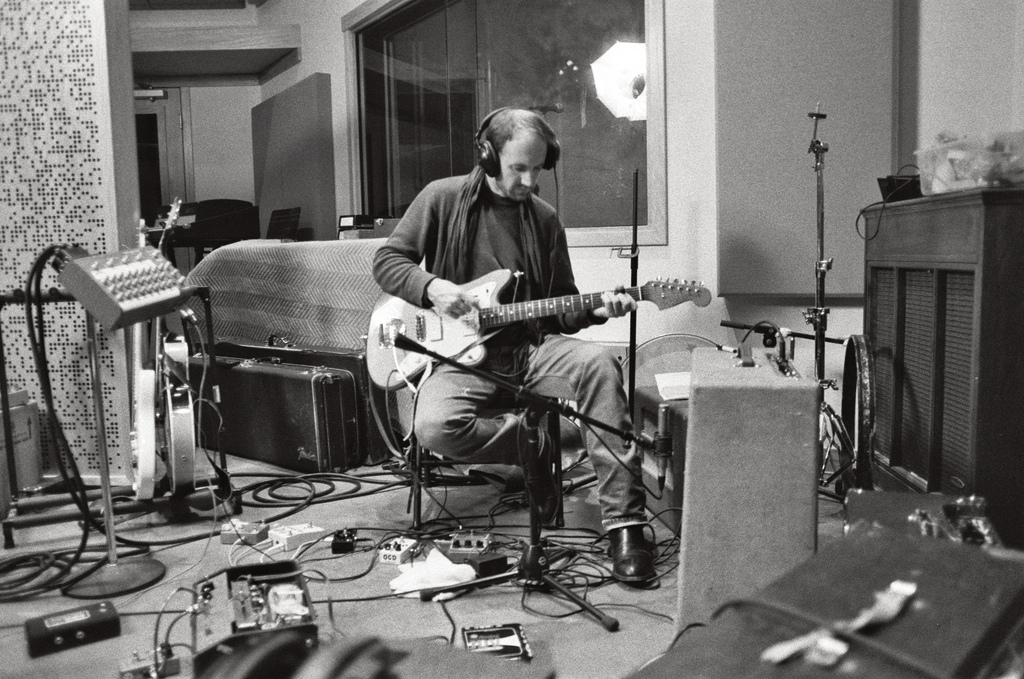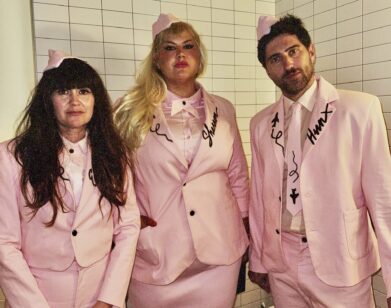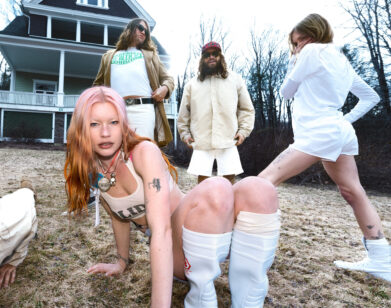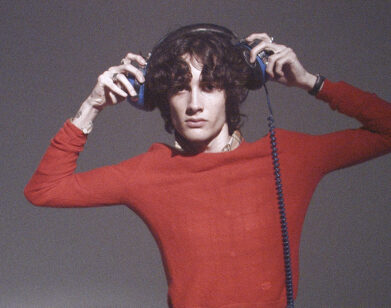Jake Bellows’ New Frequency

ABOVE: JAKE BELLOWS. IMAGE COURTESY OF TONY BONACCI
Jake Bellows is making his comeback. After serving as Neva Dinova’s frontman for 15 years (and then taking a break from music), he’s back with new material: soulful music amplified by fuzzy guitar and philosophical lyrics. Bellows’ solo music is a reflection of himself, but in a light that most of Neva Dinova’s fans have not yet seen.
Over the past few years, Bellows moved from Omaha to California, but not before recording 18 demos with musician and engineer Ben Brodin (known for his work with Conor Oberst). Following the move, Bellows went from playing shows with the likes of Death Cab for Cutie, M. Ward, and Rilo Kiley to trading in his guitar for a Datsun pick-up truck and installing glass doors. Bellows thought he had quit music—but music, he explains, hadn’t quit him. The result is New Ocean, Bellows’ solo debut, which compiles his introspective songwriting since his departure from Neva Dinova.
We spoke with Jake Bellows about almost quitting music, working odd jobs, and finding music in science.
ILANA KAPLAN: What did you do during the time you were taking a break?
JAKE BELLOWS: I worked at Jimmy John’s, a sandwich delivery shop. They’re really popular in college towns. I delivered sandwiches. I shot pool and drank some tequila. Really, it wasn’t a super productive piece of time. At a point, I moved. I got that $500 rebate from the government—that tax rebate. I threw all of my stuff in a Beetle, and I drove out to California. That’s where I am now.
KAPLAN: How long was your musical break?
BELLOWS: I feel like the last tour was in 2009. I think the last show was in 2009. I took a substantial break of two years.
KAPLAN: What was the most challenging part of taking a break for two years and going back into the studio?
BELLOWS: I was still kind of making music and stuff. I think all of a sudden I didn’t know why I was making music. I knew I was compelled to do it, but I didn’t know why. I kind of started thinking about that. I did some studying of other types of sciences. I tried to learn what electricity is. All I really knew about it is that it came out of a wall and you have to be careful. I tried to learn more about it. I learned about energy, particular frequencies and what it’s capable of. I learned that light, and sound, too, are both energy in different frequencies. You know alpha and beta waves and waves that come out of your brain are energy? They actually interact with the physical environment around you. When you’re thinking about something, that thought actual travels through your head. They’re spread out from your head after a thought. That thought actually travels like a wave from that point. It’s kind of amazing. It’s just cool to have it totally confirmed by science. It changes things a little bit. Have you heard of Nikola Tesla?
KAPLAN: I definitely learned about him at some point during my academic career.
BELLOWS: So, he’s a genius scientist and thinker from back in the day, but he created this machine. Someone dubbed it the “Death Ray.” Essentially it worked on this very principle, that every single thing that exists travel at a particular frequency. Using this machine he was able to show that every single thing travels at a particular frequency and affects the outside world.
KAPLAN: That’s a crazy thing to think about. How has your solo music evolved from the music you made in Neva Dinova?
BELLOWS: These things that I was learning had an influence on me. So if I’m working with frequencies, I’m basically trying to put out more frequency. Every time you play a chord, they have a harmonic relationship with each another. By doing that, you are creating something that has an effect on the physical world. I was also studying some mythology, if you have ever heard of Joseph Campbell. I came into it really late. I was reading The Hero with a Thousand Faces. He references a bunch of old mythology, theology, and a lot of the Genesis stories in different religions. There’s some kind of frequency to it. It ended up parallel to Western science. All of a sudden, there was more responsibility than expressing yourself. Whatever people make art for, it’s an important job to make the world better somehow.
KAPLAN: That’s really interesting. It’s important to feel like you have an impact on the world. Will you be playing some solo shows?
BELLOWS: Right now I have some solo tours planned. As far as another band goes, there’s a bunch of bands I’d love to tour with. I haven’t really put together a wish list. I was just thinking about The Flaming Lips today. Those guys are on a really cool trip. They care about community. I love that about them.
KAPLAN: That would be a crazy and fun show.
BELLOWS: Oh, my God! So cool. I know. I’ve seen those guys a couple of times. They are such enigmatic performers. I just like it. They’re good.
KAPLAN: Do you think that Neva Dinova fans are going to be really excited for your solo work? Do you think fans will migrate to your music?
BELLOWS: I’ve been concerned about it a little bit because I’m been getting a little older, and it’s hard to want to start over from zero, and not be able to take those fans with me. Recently the download came out. Some people have been pre-ordering the record. I’ve been getting some nice responses as people have been sending me messages. People seem to like it. Some of them are stoked on what this is. I guess time will tell, but I hope that people are still interested despite this slight change in direction.
JAKE BELLOWS’ DEBUT RECORD, NEW OCEAN, IS OUT NOW.






